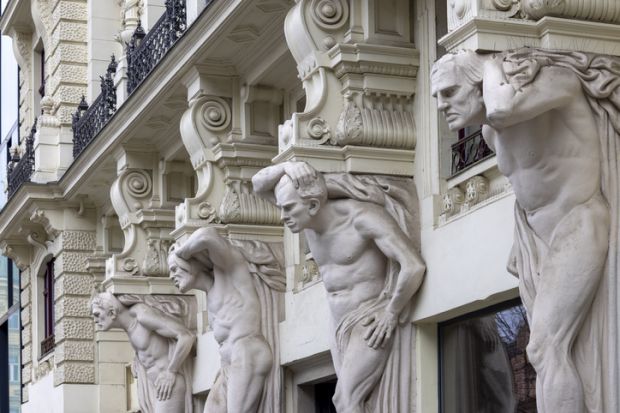Junior academics are leaving poorly paid arts and humanities jobs in Czech universities because of promises of higher salaries in schools, it has been warned.
Jan Suk, head of the department of English language and literature at the University of Hradec Králové, told Times Higher Education he had lost four colleagues in two years to primary or secondary schools, motivated in part by salaries that can be double those at the regional university.
He said the only way for lecturers to “decently survive” was by taking outside work, “which, considering the ridiculousness of their income, is usually not only a side job but a second full-time job”, leaving academics in a “never-ending struggle with deadlines, fatigue and demotivation”.
Concern is not confined to small cities such as Hradec Králové, said Pavel Doleček, vice-rector for strategic cooperation and development at Prague’s Charles University. “For many of our assistants at the faculties it’s now much more viable to work in the primary and secondary schools as a teacher. This is something I’m a little bit afraid of.”
Aside from losses to schools, there are also tensions between disciplines. The Seznam Zprávy news website recently published ministry figures showing vast disciplinary differences in the incomes of academics at Charles and other universities, taking into account grants and other external funding.
Monthly incomes for an assistant, typically a full-time staff member with a master’s degree and a focus on teaching, range from 82,540 Czech koruna (£3,090) in the social sciences to just 44,560 Kč for those in the arts, with those in law and theology getting even less. Dr Doleček, who was until 2022 deputy minister for higher education, said a major part of the problem was faculties’ dependence on winning grant funding. He said Charles was investing in application support for faculties that struggled to bag grants.
At the end of March, on Teacher’s Day, around 1,000 academics marched through Prague to the education ministry, including philosophers rolling a mock-up Sisyphean boulder, to protest low pay, with parallel gatherings occurring in other cities.
The government has taken notice. Education minister Vladimír Balaš acknowledged in a recent letter to university heads that overall funding was an issue, asking them to explain how they planned to resolve the disciplinary pay gaps and spend resources more efficiently. For one protester, Petra Poncarová, an academic assistant and specialist in Scottish literature at Charles, the language used by Mr Balaš and the prime minister and former university rector Petr Fiala to discuss the protests dangerously denigrated the arts and humanities.
“Look to Hungary – a country close to us geographically and culturally – look to Poland, and be careful about what you say, because it starts with this sort of rhetoric: ‘you’re superfluous, you’re a waste of money’,” she said.
Education ministry spokeswoman Aneta Lednová told THE both ministers “undoubtedly believe” in the value of social science and humanities degrees “not only to the job market but also to the development of culture and democracy”.
Appreciation of “soft” disciplines has particular resonance in the Czech Republic, with protesters trooping past a statue of the sociologist and founding father of the modern state, Tomáš Masaryk, while many leading figures in the 1989 Velvet Revolution had academic backgrounds in the arts and humanities.
The chair of the Czech Rectors Conference, Martin Bareš, said in a statement it had “deep concern” about higher education funding, citing a fall in its share of overall education funding from 18 per cent in 2010 to 12 per cent in 2021. “Higher demands on the higher education sector are coming and will continue to come also with the growing demographic curve,” he said. The management of Charles said in its own statement it was “not realistic to expect internal mechanisms to independently resolve the long-term, systematic underfunding of the entire sector”.
“The current situation at universities teaching humanities programmes is a ticking bomb,” said Hradec Králové’s Professor Suk. “The financial aspect for the majority of colleagues is unsustainable in the long term.”
Register to continue
Why register?
- Registration is free and only takes a moment
- Once registered, you can read 3 articles a month
- Sign up for our newsletter
Subscribe
Or subscribe for unlimited access to:
- Unlimited access to news, views, insights & reviews
- Digital editions
- Digital access to THE’s university and college rankings analysis
Already registered or a current subscriber? Login








